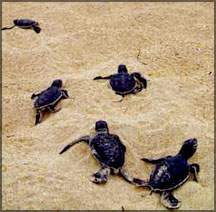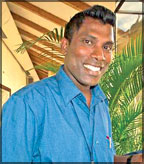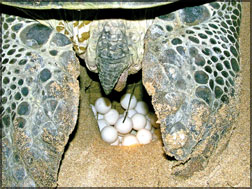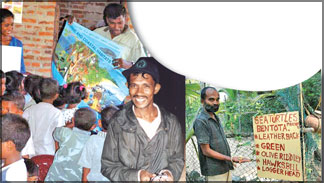
Conserving Turtles
Avanthi Fernando

Turtles crawling to the beach |
Thushara Weerawanna hides behind a seaweed bush until the pitch dark
night sets in and waits for the beautiful sea turtle to saunter ashore
to lay her eggs. She crawls slowly, takes time and great pain to dig a
unique egg-shaped basin to deposit her eggs.
However, Thushara stealthily creeps over in time to pick the
‘precious gems’ as they are so called at the market, as she lays them.
They will fetch a good price for its valuable demand. Deep in his heart,
he knows well that it is not only a crime but as a Buddhist, it is
against his principles. Yet he continues to engage in this trade for the
wailing of his children’s hungry tummies outweighs the wails of the
turtle.
Today, Thushara is an authorised turtle nest protector and the best
tour guide for it is his duty to ensure that eggs are protected and
guaranteed of hatching. He guides small groups of tourists quietly to
witness the joy of heralding a new turtle generation that were once
considered an endangered species.
|

Thushan Kapurusinghe, head of the Turtle Conservation Project |
Thanks to the Turtle Conservation Project (TCP) who recently tasted
success at the World Travel & Tourism Council 2008 award in Dubai as
finalist (out of 46 countries), the future of Sri Lanka’s turtle
population is now warranted as safe. TCP’s vision is to harness a
“sustainable level for the sea turtle population in Sri Lanka”.
It was established with not only the aim of marine turtle
conservation but also rehabilitating the entire community of Rekawa
which are part and parcel of sustaining the lives of the turtles.
Sri Lanka is home to five out of 7 turtle species in the world.
Thushan Kapurusinghe, the Head of TCP highlighted “We decided to have a
holistic approach where we conducted a comprehensive socio-economic
survey of the Rekawa community and their lifestyles”.
Thereafter, after considerable research, TCP formulated an ecotourism
community-based solution. “We had to prevent the deforestation of
mangroves which supported the ecosystem in which the sea grass bed
depended upon and the turtles fed on these.
|

Turtle laying eggs
|
The mangrove stumps were burnt to power the lime kilns where corals
which were illegally mined by Rekawa’s famous women divers, were used”,
emphasised Thushan. Thus, he explained the vicious system that was
needed to be changed in order to fulfill the requirements of a solution
to the turtle crisis.
TCP developed an innovative technology called the ‘Community Based
Ecosystem Conservation Approach’ (CBECA) where 7 methodologies were
used. These include developing the community’s livelihood, its
infrastructure, environmental restoration, education with awareness,
partnership building, knowledge sharing and promotion and utilisation of
local culture and traditional knowledge. Even though the tsunami took
away three of the TCP staffer’s lives and destroyed all their equipment,
they managed to hold their ground and rebuild their lives and the
project too.
Community based organisations (CBOs) were assigned to each aspect of
the turtle project and alternative livelihoods were provided to Rekawa’s
community by training and education.
For example, the Nature Friends of Rekawa were the former turtle egg
poachers’ association and the women divers formed the ‘Community Batik
Group’. The Sri Lanka Tourism Board chipped in to further strengthen
them with a ‘Tourist Guide Training’ programme.
|

Education on turtles by TCP
Species of turtles in Sri Lanka |
The Department of Wildlife Conservation have enforced laws to prevent
anyone overstepping the boundaries of going back to turtle poaching in
the community and so far, nobody has ever gone back to that terrible
practise for now there is no market for turtle souvenirs or food.
Even schools have it in their curriculum to study about turtles and
cultural shows are organised to depict how important it is to save them.
Bus halts around Rekawa have the turtle theme which exudes a peaceful
ambience.
Little by little as the project breathes success, many are looking at
TCP as a model project for not only protecting an endangered species but
also developing the community to realise that they can profit rather
than destroy it.
“From 1993 when we first started as two British foreigners and I
slept on the beach, residing in cowsheds till now as we clinched the
world’s top 10 eco-friendly destinations, we are glad that the turtles
have benefited immensely and we will make sure it continues,” hopes
Thushan. They have previously won British Airway’s ‘Tourism for
Tomorrow’ award in 1998 and have also been featured on the BBC Saving
Planet Earth’s documentary series.
TCP acknowledges the Department of Wildlife Conservation, The Sri
Lanka Tourist Board, the Conservation Department, Marine Conservation
Society, UNDP GEF SGP, CIDA, SCOTIA USAID, UNV SL, Mercy Corps,
International Fund for Animal Welfare and AdoptSriLanka. |

